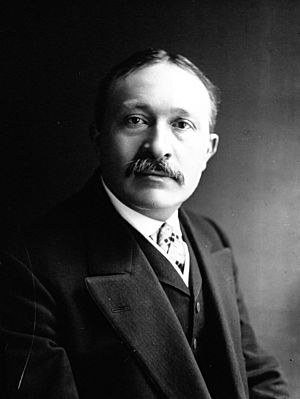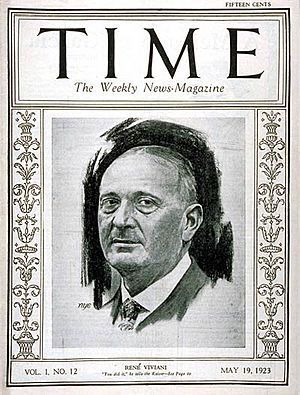René Viviani facts for kids
Quick facts for kids
René Viviani
|
|
|---|---|

Viviani in 1912
|
|
| Prime Minister of France | |
| In office 13 June 1914 – 29 October 1915 |
|
| President | Raymond Poincaré |
| Preceded by | Alexandre Ribot |
| Succeeded by | Aristide Briand |
| Personal details | |
| Born |
Jean Raphaël Adrien René Viviani
8 November 1863 Sidi Bel Abbès, French Algeria |
| Died | 7 September 1925 (aged 61) Le Plessis-Robinson, Paris, France |
| Political party | PRS |
René Viviani (born Jean Raphaël Adrien René Viviani; 8 November 1863 – 7 September 1925) was an important French politician. He served as the Prime Minister of France during the first year of World War I. Viviani was born in Sidi Bel Abbès, which was then part of French Algeria. In France, he worked hard to protect the rights of workers and those who supported socialist ideas.
Contents
Life and Political Career

René Viviani came from a family of Italian immigrants. He started his political career in 1893. He was elected as a "deputy" for Paris, which is like being a representative in the government. He held this job until 1902.
After a short break, he was elected again in 1906 for the Department of Creuse. In the same year, he joined the government cabinet of Georges Clemenceau. Viviani was known for being a very good speaker and a strong leader in the Socialist party.
He later became an "Independent Socialist." This meant he didn't join the main Unified Socialist party when it was reorganized. He also served as the Minister of Public Instruction, which meant he was in charge of education.
Becoming Prime Minister
In the spring of 1914, a new group of politicians was elected. They were very radical, meaning they wanted big changes. It was hard for them to agree on who should be the Prime Minister.
Finally, René Viviani was chosen as Prime Minister on 13 June 1914. This was decided by President Raymond Poincaré. He received a strong vote of confidence from the government.
The main issues at the time were keeping a law that required three years of army service. Another big issue was getting a large loan of 1.8 billion francs for military preparations. Viviani supported both of these important measures.
Leading During World War I
Viviani was Prime Minister during the start of World War I. This was a very difficult time for France. He worked closely with President Poincaré during the July Crisis, which was when tensions quickly rose before the war began.
On 26 August 1914, Viviani changed his government cabinet to focus on the war effort. He brought in Alexandre Millerand as the Minister of War. In June 1915, Viviani, President Poincaré, and Millerand met with top military commanders. This was a rare meeting where political leaders tried to oversee the military during the war.
End of His Time as Prime Minister
By the autumn of 1915, Viviani's government faced many problems. The Foreign Minister, Théophile Delcassé, resigned. There was also an unsuccessful military attack on the western front. And Bulgaria joined the war on the side of France's enemies.
Even though he survived a vote of no confidence, many politicians did not support him. So, he resigned on 27 October 1915. After this, Viviani served as the Deputy Prime Minister in Aristide Briand's new government.
Later Contributions
In April 1917, Viviani led a special trip to the United States. The US had just joined the war to help the Allies. During this trip, he was often overshadowed by Marshal Joffre, a famous French general.
While Viviani was Prime Minister, an important law was passed in July 1915. This law created special groups to set fair wages for women who worked from home in the clothing industry.
In May 1919, Viviani gave a powerful speech supporting women's right to vote. The Chamber of Deputies, which is like a parliament, voted in favor of women's suffrage. This was a big step forward for women's rights in France.
See also
 In Spanish: René Viviani para niños
In Spanish: René Viviani para niños
- Square René Viviani is a small public space near Notre-Dame in central Paris, named for Viviani
Images for kids
 | Ernest Everett Just |
 | Mary Jackson |
 | Emmett Chappelle |
 | Marie Maynard Daly |


